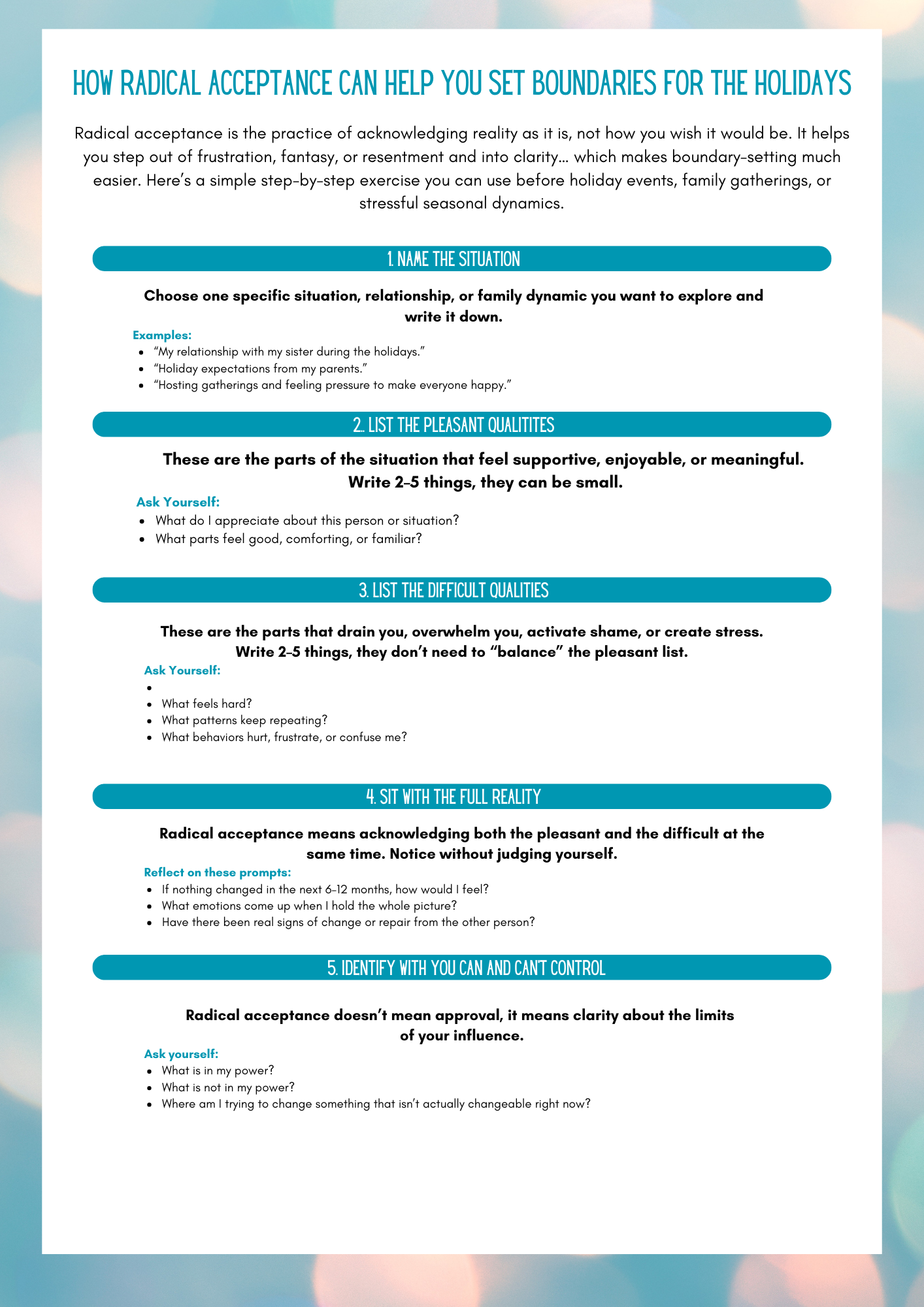How Radical Acceptance Can Help You Set Boundaries for the Holidays (downloadable exercise)
The holiday season brings a mix of joy, obligation, nostalgia, pressure, and if we’re being honest, a lot of emotional labor. Many people find that this time of year intensifies old family roles, unresolved dynamics, or expectations that feel impossible to meet.
If you struggle with saying no, feel guilty enforcing your limits, or often leave gatherings emotionally depleted, you’re not alone. A big part of boundary setting begins earlier than we think, not during the moment of conflict, but in the moment we accept what is actually true about our relationships, our limits, and our needs.
This is where radical acceptance becomes an essential tool. You can download the Holiday Radical Acceptance Sheet here.
What Is Radical Acceptance?
Radical acceptance means acknowledging reality as it is…not as we wish it were. It doesn’t mean approving of hurtful behavior, excusing dysfunction, or abandoning hope. Instead, it means telling the truth:
“This is the relationship I actually have… not the relationship I hope it will be.”
When you can see both the pleasant and the difficult qualities of a person or situation, you stop trying to force a dynamic that doesn’t exist. That clarity makes it much easier to set boundaries that protect your emotional, physical, and mental energy.
Why Radical Acceptance Matters During the Holidays
Holiday pressure often activates old roles, caregiving expectations, cultural norms, and guilt. Without radical acceptance, we tend to react in one of two ways:
1. Over-functioning:
Saying yes to everything, taking care of everyone, becoming the emotional buffer, sacrificing your needs because “that’s just what I do.”
2. Under-bounding:
Ignoring red flags, pretending things don’t bother you, pushing away your own limits to “keep the peace.”
Both of these approaches come from a place of coping, but they lead to burnout, resentment, and depletion.
Radical acceptance interrupts this cycle.
It helps you see clearly:
This person may not respond well to direct feedback.
This dynamic may always feel a little one sided.
This relative may not respect emotional boundaries.
This situation won’t magically feel different just because it’s a holiday.
And from that truth, you get to ask:
“Given the reality, what boundaries support my wellbeing?”
A Simple 3-Step Holiday Boundary Method Using Radical Acceptance
Step 1: Name the Pleasant and the Difficult
Use the worksheet’s Part 1 to explore the pleasant qualities and difficult qualities of the relationship or holiday situation.
This matters because most relationships are mixed and seeing the whole picture makes boundaries more humane and realistic.
Step 2: Ask Radical Acceptance Questions
The worksheet includes prompts like:
What if nothing changes in the next 6–12 months?
How do I feel when I sit with both the pleasant and the difficult?
Has this person taken steps to change harmful behaviors?
These questions don’t judge the other person, instead they help you see what is yours to carry and what is not.
Step 3: Choose Boundaries Based on the Type of Labor Being Impacted
The worksheet breaks boundaries into four domains:
Emotional labor
Time labor
Intellectual labor
Physical labor
This framework is especially helpful during the holidays because so many stressors fall into these categories.
For example:
If a family member drains your emotional labor: set limits around what you share or how long you engage.
If someone monopolizes your time: set time boundaries (arrival/departure times, frequency of contacts).
If someone argues politics: set intellectual boundaries (topics you won’t engage in).
If someone comments on your body or parenting: set physical or emotional boundaries (redirect, decline, or physically step away).
Boundaries aren’t punishments! They clarity about what you will and won’t do.
Realistic Holiday Boundary Examples Inspired by the Worksheet
These examples mirror the worksheet’s structure and can be adapted to your situation:
If a relative makes passive-aggressive comments:
“I won’t engage with passive aggressive remarks. I’ll redirect the conversation once, then I’ll take space.”
If time with family leaves you emotionally depleted:
“I’ll attend for two hours, then leave to take care of myself.”
If someone tries to pull you into gossip or drama
“I’m not comfortable talking about other people. Let’s change the topic.”
or maybe a subtle boundary, answering with a shrug, “Eh, it’s not something I think about much”.
If a family member gives unwanted advice:
“I appreciate that you care, but I’m not looking for advice on this.”
If someone comments about your body, food, kids, or lifestyle:
“Yeah, I don’t go into that stuff.”
These boundaries are not about confrontation, they’re about self respect, self protection, and truthful engagement.
Why Boundaries Feel Easier When You Start With Acceptance
Radical acceptance decreases the “fantasy pressure” we put on the holidays:
the fantasy that they’ll behave differently
the fantasy that we won’t get triggered
the fantasy of the perfect family moment
the fantasy that we can change someone by pleasing them
When you stop fighting the reality of a relationship, you stop fighting yourself.
Your boundaries become grounded, calm, and anchored. not emotional reactions, but acts of self-care.
A Final Note: You’re Allowed to Protect Your Peace This Season
The holidays are intense for many people, not because something is wrong with you, but because old wounds, roles, and expectations show up louder.
Radical acceptance gives you a clear lens.
Boundaries give you protection.
Together, they give you agency.
Download the Radical Acceptance worksheet and use it as a structured guide this season.
If you want more tools for understanding your patterns, setting boundaries, or navigating relationships, Mind+Full Therapy has therapists that can meets you right where you’re at and provide additional support.


